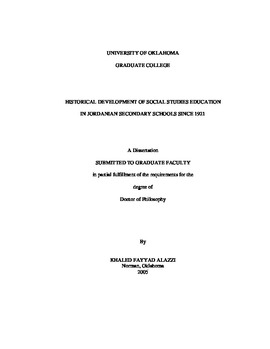| dc.contributor.advisor | Chiodo, John J., | en_US |
| dc.contributor.author | Alazzi, Khaled Fayyad. | en_US |
| dc.date.accessioned | 2013-08-16T12:19:56Z | |
| dc.date.available | 2013-08-16T12:19:56Z | |
| dc.date.issued | 2005 | en_US |
| dc.identifier.uri | https://hdl.handle.net/11244/933 | |
| dc.description.abstract | An overall analysis of data reveals that some factors in the Jordanian culture have been considered hindrances to the development of social studies education and the adoption of the new teaching approaches. These include: (a) lack of understanding of the nature of social studies education; (b) the bias in the favor on natural science and linguistic studies at all level of public education over social studies education course; (c) the shortage of well-trained social studies teachers; (d) the political system, which works against the full development of the social studies education curriculum; and (e) economic opportunity, which does not support social studies education. | en_US |
| dc.description.abstract | The study also has found that the current social studies curriculum in Jordan does not prepare students well for the future. Traditional methods dominate the curricula that do not take an inquiry approach. Therefore, Jordan does not have a curriculum that supports a democratic society. The onset of the information age demands that we take approaches to learning that are complex and move away form didactic or behavioristic models of learning and teaching. Although there have been improvements in Jordanian curriculum development in recent years, further reforms are necessary. Clearly the future demands a highly skilled and thinking citizenry currently lacking in Jordan and many parts of the Middle East. Without changing the social studies curricula, students become prisoners of the past. | en_US |
| dc.description.abstract | This study examines the influence of historical and political events on the development of social studies education in Jordan's secondary schools. It discusses the goals and techniques that Jordan's educational planners have instituted to provide students with a quality education that meets the challenge of the country's national goals. This study's intent is to analyze the historical, political, religious, and social factors that influence the development of social studies education in Jordan and, also, how these factors affected the change of the goal and purpose of social studies education, change of curriculum and instruction methods in social studies education, and change in the preparation of secondary social studies teachers. These specific areas are related to Jordan's cultural changes, including political, social, economic, and religious. | en_US |
| dc.description.abstract | The development of modern social studies education was reviewed to gain an understanding of the essence of its change and to realize the most important factors that influence that change. Understanding the past and present social studies curriculum can provide educational leaders with wisdom to foresee the extent to which future innovations in social studies curriculum can be efficiently achieved. The study reveals that past experiences provide the proper guidelines for minimizing the implementation problems of future social studies curriculum. The Palestinian problem and the principles of Great Arab Revolt that started in the early 20th century was, and still is, the major factor affecting the general social, educational, and political conditions in the modern Jordanian state. | en_US |
| dc.format.extent | xi, 97 leaves : | en_US |
| dc.subject | Education, History of. | en_US |
| dc.subject | Education, Curriculum and Instruction. | en_US |
| dc.subject | Social sciences Study and teaching Jordan History. | en_US |
| dc.subject | Education, Secondary. | en_US |
| dc.subject | Education, Social Sciences. | en_US |
| dc.title | Historical development of social studies education in Jordanian secondary schools since 1921. | en_US |
| dc.type | Thesis | en_US |
| dc.thesis.degree | Ph.D. | en_US |
| dc.thesis.degreeDiscipline | Department of Instructional Leadership and Academic Curriculum | en_US |
| dc.note | Adviser: John J. Chiodo. | en_US |
| dc.note | Source: Dissertation Abstracts International, Volume: 66-12, Section: A, page: 4279. | en_US |
| ou.identifier | (UMI)AAI3203293 | en_US |
| ou.group | Jeannine Rainbolt College of Education::Department of Instructional Leadership and Academic Curriculum | |
